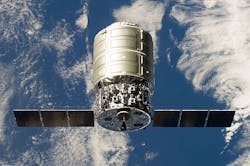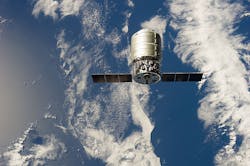Orbital ATK’s Cygnus spacecraft berths with International Space Station under NASA commercial resupply program
DULLES, Va., 9 Dec. 2015. The “S.S. Deke Slayton II” Cygnus spacecraft from Orbital ATK Inc. (NYSE:OA), a global provider of aerospace and defense technologies in Dulles, Va., completed its rendezvous and berthing procedures with the International Space Station (ISS), marking Orbital’s fourth berthing with the orbiting laboratory and the third under NASA’s Commercial Resupply Services (CRS) contract.
Cygnus was launched aboard a United Launch Alliance (ULA) Atlas V rocket on 6 December 2015 from Cape Canaveral Air Force Station, Florida. Over the past several days, it completed a series of thruster firings and other maneuvers bringing the spacecraft in close proximity to the ISS.
Final approach to the Station began at 5:00 a.m. (EST), culminating with Expedition 45 crew members grappling Cygnus with the Station’s robotic arm at 6:19 a.m., when it was approximately 30 feet from the ISS. Cygnus was then guided to its berthing port on the nadir side of the Unity module of the ISS, where its installation was completed at 9:26 a.m. (EST).
“This mission featured the debut of our enhanced Cygnus, which allowed us to transport approximately 7,700 pounds, or 3,500 kilograms, of essential supplies, equipment and scientific experiments to the astronauts on board the ISS,” says Frank Culbertson, President of Orbital ATK’s Space Systems Group. “That represents a more than 50 percent increase in capacity over the previous Cygnus model. This expanded cargo capability, along with Cygnus’ new UltraFlexTM solar array and fuel tank enhancements, allows us to deliver greater value to our NASA customer.”
The Expedition 45 crew plans to open the Cygnus hatch and make initial ingress into its cargo module to unload the cargo, including food, clothing, crew supplies, spare parts, laboratory equipment, and scientific experiments. Cygnus will remain berthed at the ISS for approximately 50 days before departing with approximately 5,050 pounds (2,300 kilograms) of disposable cargo for a safe, destructive reentry over the Pacific Ocean.
Under the CRS contract with NASA, Orbital ATK will deliver approximately 62,000 pounds (28,000 kilograms) of cargo to the ISS over 10 missions through 2018. To date, the company has delivered more than seven tons of essential supplies to the ISS since the first mission conducted in early 2014, with three additional CRS missions scheduled for 2016. Another Cygnus mission will be launched on an Atlas V in March, after which Orbital ATK’s Antares rocket will launch at least two ISS resupply missions in the second and fourth quarters of 2016.
Orbital ATK, a global provider of in aerospace and defense technologies, designs, builds, and delivers space, defense, and aviation systems for customers around the world, both as a prime contractor and merchant supplier. Its main products include launch vehicles and related propulsion systems; missile products, subsystems and defense electronics; precision weapons, armament systems and ammunition; satellites and associated space components and services; and advanced aerospace structures. Headquartered in Dulles, Virginia, Orbital ATK employs approximately 12,000 people in 18 states across the U.S. and in several international locations.
You might also like:
Subscribe today to receive all the latest aerospace technology and engineering news, delivered directly to your e-mail inbox twice a week (Tuesdays and Thursdays). Sign upfor your free subscription to the Intelligent Inbox e-newsletter at http://www.intelligent-aerospace.com/subscribe.html.
Connect with Intelligent Aerospace on social media: Twitter (@IntelligentAero), LinkedIn,Google+, and Instagram.
Relevant industry event: Embedded Real-Time Software and Systems
The ERTS² Congress (http://www.erts2016.org/about.html) is an international cross sector event on Embedded Real-Time Software and Systems for all the domains where embedded systems are central, including, but not limited to:
- aeronautics, as well as automotive, railway, subway, and marine
- satellite and space exploration
- energy
- telecommunications and wireless connectivity
- defense
- industrial control
- home automation, e-healthcare, and more

Courtney E. Howard | Chief Editor, Intelligent Aerospace
Courtney enjoys writing about all things high-tech in PennWell’s burgeoning Aerospace and Defense Group, which encompasses Intelligent Aerospace and Military & Aerospace Electronics. She’s also a self-proclaimed social-media maven, mil-aero nerd, and avid avionics and space geek. Connect with Courtney at [email protected], @coho on Twitter, on LinkedIn, and on Google+.



